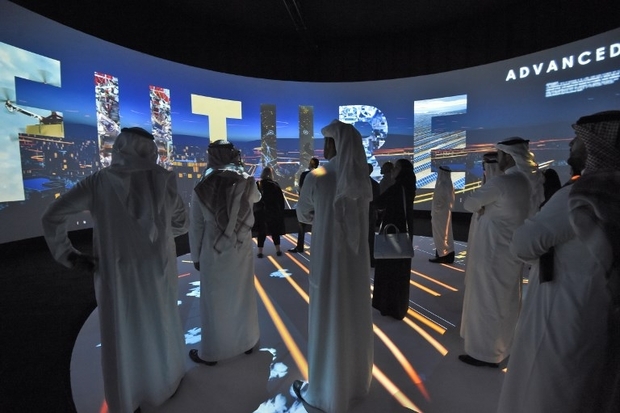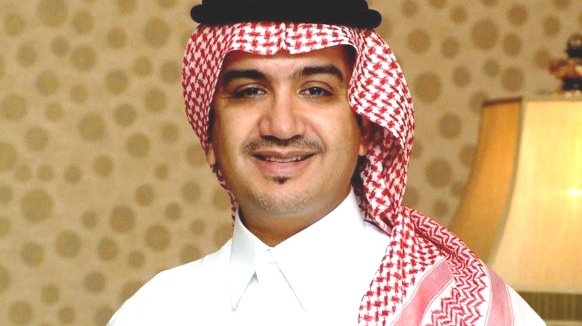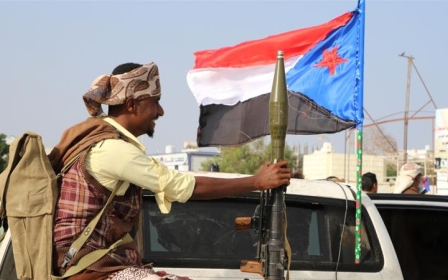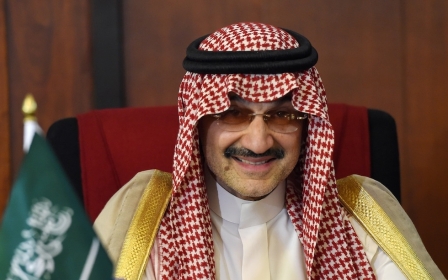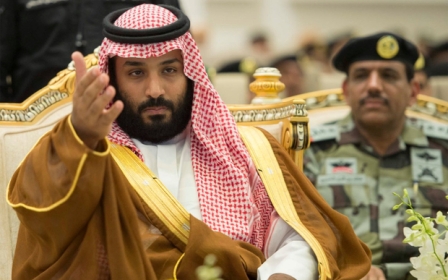'Everyone is trying to get a slice': The gold rush for Saudi cinemas
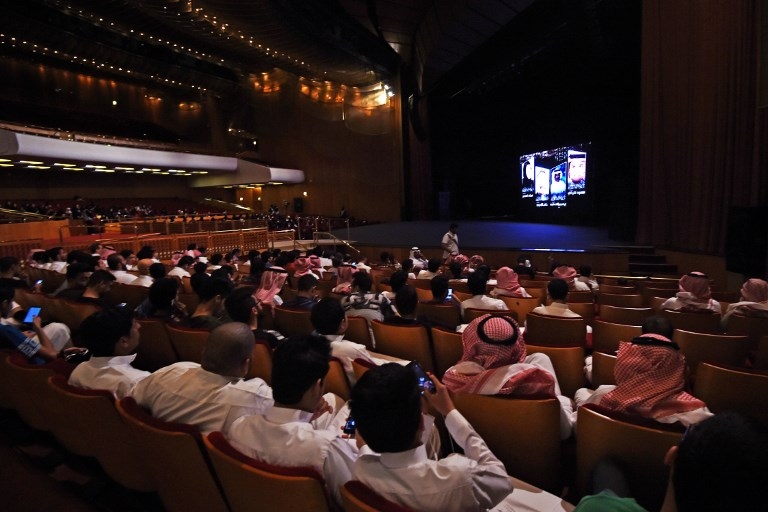
The decision by the Saudi government in December to allow cinemas opens up significant opportunities for Western entertainment companies, and the jostling for pole position is well under way.
Big corporations such as UK-based VUE, the Canadian company IMAX and the American giant AMC are all exploring commercial deals in a sector that is seen as a key driver in rebranding the global image of the kingdom.
Laura Houlgatte is the CEO of UNIC, the International Union of Cinemas. Speaking to Middle East Eye from Brussels she described the decision as “an exciting market for everyone”, adding “we know it is going to be big we just don’t know how big”.
Vision 2030 aims to nearly tripling household spending to six percent on culture and entertainment - and a significant part of that is centred on cinemas
"There’s business for everyone and everyone is trying to get a slice of the cake," she said.
The Saudi authorities believe that, over the next decade, cinemas will generate $24bn in revenues and create 30,000 new jobs with the opening of 300 theatres by 2030. Vision 2030, Crown Prince Mohammed bin Salman’s strategy to revolutionise the Saudi economy and free it from oil dependency, has set a target of nearly tripling household spending to six percent on culture and entertainment and a significant part of that is centred on cinemas.
Jason Tuvey, a Middle East economist with Capital Economics, said that though anticipated cinema revenues at less than 0.2 percent of Saudi GDP are “not massive”, the opening of cinemas is a clear signal that “Mohammed bin Salman has won out over the religious establishment” who have viewed cinemas as a threat to Saudi religious and cultural values.
“It is more of a symbolic move, one that investors will see as opening up other opportunities,” he told MEE.
Big players see big opportunities
Among those who are looking forward to doing business in the kingdom is Tim Richards, the CEO of VUE. According to the Financial Times, VUE has the inside track.
Richards received a personal invitation from Mohammed bin Salman (MbS) to attend the Future Investments Initiative in Riyadh last October. The conference, held in the Ritz-Carlton hotel, was designed to showcase Vision 2030 and encourage foreign investment.
VUE is said to be in discussions over a joint venture with the Saudi Public Investment Fund (PIF). The $200bn sovereign wealth fund comes under the jurisdiction of the Council of Economic and Development Affairs (CEDA). The chair of the council is Mohammed bin Salman. Richards was quoted as saying: “This could be a significant opportunity for VUE and we look forward to continuing our conversations in the region.”
Richard Gelfond, the chief executive, said he hopes to open 20 theatres over the next three years. Like Tim Richards, he talks of potential for growth in a country with a population of 32 million who have been denied the simple pleasure of going to the cinema. “For the size of this market, there's a big opportunity,” Gelfond said.
AMC, which includes the Odeon chain, is the largest cinema operator in the world. Adam Aron, its chief executive, believes it is a market that is “avid” for the chance to go to the movies and said his company was “quite optimistic that our future is lucrative and bright in Saudi Arabia”, noting that “50 percent of the population is under the age of 25. I think they are thirsty for liberalization and very excited about it.”
He expects to open the first AMC theatre by the end of 2018 and adds “we expect to be a major player in the Saudi (entertainment) industry”.
Concerning censorship and the sort of films that will play in the kingdom, Aron anticipates the movies that will go into Saudi cinemas will be a “similar film product” to what is currently available in Dubai and Bahrain.
The decision also opens the door for the nascent Saudi film industry. Director Hajar al-Naim’s film Detained has played outside the kingdom. “Finally, I can show my works (in Saudi cinemas)," she said.
As for subject matter, she said: “We are, as filmmakers, affected by European cinema, Iranian cinema and American cinema and that will affect the way in which we tell our stories.”
'The arrests of dozens of critics means that most filmmakers will need no reminding of the ‘red lines’ that they cross at their own risk'
- Kristian Coates Ulrichsen, Baker Institute Fellow for the Middle East
Kristian Coates Ulrichsen, a Baker Institute Fellow for the Middle East, told MEE that opening up cinemas and encouraging Saudi filmmakers will “burnish the crown prince’s populist credentials and his appeal to Saudi youth".
However, citing a wave of arrests that occurred in September of last year, he cautioned that Saudi filmmakers will have to be careful about their choice of subject matter.
“The arrests of dozens of critics means that most filmmakers will need no reminding of the ‘red lines’ that they cross at their own risk," he said.
Entertainment moguls seized in anti-corruption drive
In the rush to capture the entertainment business in Saudi Arabia, little if any concern has been expressed about a second wave arrest of hundreds of Saudi businessmen and senior members of the ruling family in early November. They were incarcerated in the same Ritz-Carlton hotel that two weeks previously had entertained foreign investors at the Future Investments Initiative conference.
The seizures were presented by the government as part of a sweeping crackdown on corruption. Among those detained were three powerful Saudi players in the entertainment and media sector: Prince Alwaleed bin Talal, who owns Rotana Media Services through his Kingdom Holdings company, Saleh Kamal, the founder of Arab Radio and Television Network (ART), and Waleed al-Ibrahim, who owns a controlling share in Middle East Broadcasting Centre (MBC).
Jason Tuvey of Capital Economics suggests that a deal may have been struck with an understanding that MBC editorial policy would strongly support Mohammed bin Salman and promote government initiatives related to Vision 2030. “It is an arrangement that gives MbS what he wants but does not scare off investors," he said.
That is a strategy that seems to be working. Mohammed bin Salman, in addition to his duties as crown prince, chair of CEDA, defence minister and first deputy prime minister, is head of the anti-corruption committee responsible for the arrests. In that role, he has been careful to limit the investigation to Saudi nationals and not to widen it to examine their connections to foreign companies with which they may be partnered.
When asked about the arrests of the three Saudi media moguls and whether it might cause Western cinema companies to hesitate, UNIC’s Laura Houlgatte said that she hadn’t heard any of her members expressing such concerns. The only comments she had heard were all “extremely positive".
“This is a new market, (opening cinemas) sends a good signal to the rest of the world and it will be fascinating to watch how it develops," she said.
More than the movies
Mohammed bin Salman isn’t limiting his entertainment vision to cinema. As Vision 2030 puts it: "We are well aware that the cultural and entertainment opportunities currently available do not reflect the rising aspirations of our citizens and residents, nor are they in harmony with our prosperous economy."
Music and food festivals, fashion shows, live theatre and sports are all seen as effective ways to connect with the young Saudis who constitute his support base as he drives through fundamental economic and social change in the kingdom.
It also is a way of saying to the world that Saudi Arabia, the so-called “secret kingdom” and the land of a puritanical strand of Islam, is open to change and open to the entertainment business while it moves rapidly towards what MbS calls “moderate Islam".
Also in play is a deal with Six Flags which according to its website is “the world’s largest regional theme park company with $1.3bn in revenue and 20 parks across North America”. The company plans to build three theme parks in Saudi Arabia by 2021 with the executive chairman of Six Flags acknowledging they will probably be owned by the Saudi government. Each park will cost between $300m to $500m to build.
Mohammed bin Salman has shrewdly grasped the role that entertainment will play in driving forward his efforts to transform the kingdom economically and culturally. For their part, major entertainment industry players see huge opportunities and big returns in helping him achieve his goals. They well know that the crown prince is the key to unlocking a rich new terrain.
They understand, as Jason Tuvey puts it that “whatever MbS wants or says goes".
New MEE newsletter: Jerusalem Dispatch
Sign up to get the latest insights and analysis on Israel-Palestine, alongside Turkey Unpacked and other MEE newsletters
Middle East Eye delivers independent and unrivalled coverage and analysis of the Middle East, North Africa and beyond. To learn more about republishing this content and the associated fees, please fill out this form. More about MEE can be found here.


